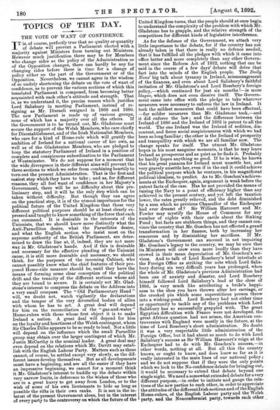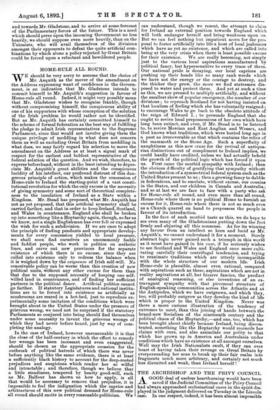TOPICS OF THE DAY.
THE VOTE OF WANT OF CONFIDENCE.
IT is, of course, perfectly true that no quality or quantity of debate will prevent a Parliament elected with a majority against Ministers from turning out Ministers. However much justification there may be for Members who change sides as the policy of the Administration or of the Opposition changes, there can hardly be any for changing sides before there is time for a change of policy either on the part of the Government or of the Opposition. Nevertheless, we cannot agree in the wisdom of so unduly shortening the debate on the vote of want of confidence, as to prevent the various sections of which this tesselated Parliament is composed, from becoming better acquainted with each other's attitude and strength. That is, as we understand it, the precise reason which justifies Lord Salisbury in meeting Parliament, instead of re- signing as Mr. Disraeli resigned in 1868 and 1880. The new Parliament is made up of various groups, none of which has a majority over all the others. If the Government is to be turned out, Mr. Gladstone must secure the support of the Welsh Members, who care chiefly for Disestablishment, and of the Irish Nationalist Members, who care for a kind of Home-rule which will gratify the ambition of Ireland for a national career of her own, as well as of the Gladstonian Members, who are pledged to keep the statutory Parliament of Ireland in a position of complete and conspicuous subordination to the Parliament at Westminster. We do not suppose for a moment that the wide divergence in their different aims will prevent the three sections to which we refer from combining heartily to turn out the present Administration. That is the first and easiest step which they have to take ; and as, for different reasons, they all feel want of confidence in her Majesty's Government, there will be no difficulty about this pre- liminary step, and it will be the only step which can be taken without difficulty. But though they can agree on the practical step, it is of the utmost importance for the political future of the United Kingdom that these very different political purposes should be at least clearly ex- pressed and taught to know something of the force that each can command. It is desirable in the interests of the Unionists, that we should know more distinctly what the Anti-Parnellites desire, what the Parnellites desire, and what the English section who insist most on the supreme authority of the British Parliament, are deter- mined to draw the line at, if, indeed, they are not mere wax in Mr. Gladstone's hands. And if this is desirable and necessary for the effective pleading of the Unionist cause, it is still more desirable and necessary, we should think, for the purposes of the incoming Cabinet, who cannot possibly know what the chief features of their pro- posed Home-rule measure should be, until they have the means of forming some clear conception of the political drift and the tenacity of the different sections whose aid they are bound to secure. It is certainly not Mr. Glad- stone's interest to compress the debate on the Address into a very small compass. The "Old Parliamentary Hand" will, we doubt not, watch vigilantly the declarations and the temper of the very diversified bodies of allies with whom he has to act. A great deal will depend for him on the reconciliation of the " gas-and-water " Home-rulers with those whose first object it is to make Ireland a, nation. A great deal will depend for him on the loyalty and heartiness of the Welsh contingent, whom Sir Charles Dilke appears to be so ready to lead. Not a little will depend on the influence which the small Parnellite group may obtain over the larger contingent of which Mr. Justin McCarthy is the nominal leader. A great deal may even depend on the relations which Mr. Davitt may estab- lish with the English Labour Party. Matters such as these cannot, of course, be settled except very slowly, as the dif- ferent issues develop themselves. But as all developments must have a beginning, and are all the easier if they have an impressive beginning, we cannot for a moment think it Mr. Gladstone's interest to huddle up the debate within very narrow limits, in deference to the wishes of those who are in a great hurry to get away from London, or to the wish of some of his own lieutenants to hide as long as possible the rifts in their own ranks. It is not in the in- terest of the present Government alone, but in the interest of every party to the controversy on which the future of the United Kingdom turns, that the people should at once begin to understand the complexity of the problem with which Mr. Gladstone has to grapple, and the relative strength of the competitors for different kinds of legislative interference.
As for the defence of the Government, we attach very little importance to the debate, for if the country has not already taken in that there is really no defence needed,. that it has fulfilled all the pledges with which it came into office better and more completely than any other Govern- ment since the Reform Act of 1832, nothing that can be said in the course of a few days' debate will drive that fact into the minds of the English people. The Daily News' big talk about tyranny in Ireland, mismanagement of the finances, and even about Lord Salisbury's faithful imitation of Mr. Gladstone's and Lord Rosebery's foreign policy,—which continued for just six months !—is mere blague, which does not even deceive itself. The Govern- ment came into office with the pledge to take whatever measures were necessary to enforce the law in Ireland. It took the mildest measures that could have been effectual, —far milder measures than Mr. Gladstone took,—and it did enforce the law ; and the difference between the Ireland of 1886 and the Ireland of 1892 is patent to all the world. The one Ireland was the Ireland of sedition, dis- content, and fierce social suspiciousness with which we had. been so long familiar ; the other is the Ireland of prosperity and tranquillity with which we are all familiar now. The change speaks for itself. The utmost Mr. Gladstone hopes in his most sanguine moments, is that he may leave Ireland as prosperous and as quiet as he finds it. Probably he hardly hopes anything so good. If he is wise, he knows that his great panacea for Ireland must unsettle her, and very gravely unsettle her, even if in the end it could achieve the political purpose which he ventures, in his magnificent political idealism, to predict. As to Mr. Goschen's achieve- ments at the Exchequer, again, argument is weak before the patent facts of the ease. Has he not provided the means of raising the Navy to a point of efficiency higher than any achieved in the present century, and yet left the taxation lower, the rates greatly relieved, and the debt diminished by a sum which no previous Chancellor of the Exchequer had ever dreamt of ? Sir William Harcourt and Mr. Fowler may mystify the House of Commons for any number of nights with their cavils about the Sinking Fund ; but facts are stubborn things, and they cannot con- vince the country that Mr. Goschen has not effected a grand transformation in her finance, both by increasing her resources and by diminishing her sacrifices. If Mr. Gladstone's Government can succeed in not impairing Mr. Goschen's legacy to the country, we may be sure that its Ministers will crow even more loudly than they have crowed in their mean depreciation of Mr. Goschen's ser- vices. And to talk of Lord Rosebery's brief interlude at the Foreign Office as striking the note which Lord Salis- bury during six very difficult years has prolonged, when the whole Mr. Gladstone's previous Administration had been one of anxiety and disaster, and Lord Rosebery himself followed Lord Salisbury's lead at the close of 1885, is very much like attributing a bride's happi- ness to the shoe you have thrown after her carriage, or the crooked pin which some superstitious person threw into a wishing-pond. Lord Rosebery had not either time or opportunity to tackle any of the problems which Lord Salisbury has so successfully grappled with. The great Egyptian difficulties with France were not developed, the great African question had not arisen, the American con- troversies with England were mostly in the future, at the time of Lord Rosebery's short administration. No doubt it was a very respectable little administration of the Foreign Office, but it had about as much to do with Lord Salisbury's success as Sir William Harcourt's reign at the Exchequer had to do with Mr. Goschen's success,—in other words, nothing at all. But all this the country knows, or ought to know, and does know so far as it is really interested in the main lines of our national policy ; and we do not suppose that if they were the only points which we look to the No-confidence debate for bringing out, it would be necessary to extend that debate beyond one single night. We need a somewhat extended debate for a very different purpose,—in order to initiate and gauge the rela- tions of the new parties to each other, in order to appreciate the attitudes of the differentIrish sections and of the English Home-rulers, of the English Labour party and the Welsh party, and. the Nonconformist party, towards each other and towards Mr. Gladstone, and to arrive at some forecast of the Parliamentary forces of the future. This is a need which should press upon the incoming Government no less heavily, we should suppose even more heavily, than on the Unionists, who will avail themselves of the divisions amongst their opponents to defeat the quite artificial com- binations by which alone a policy rejected by Great Britain could be forced upon a reluctant and bewildered people.



































 Previous page
Previous page